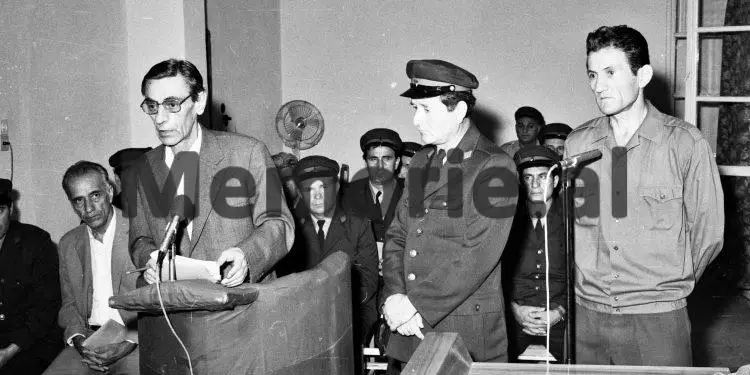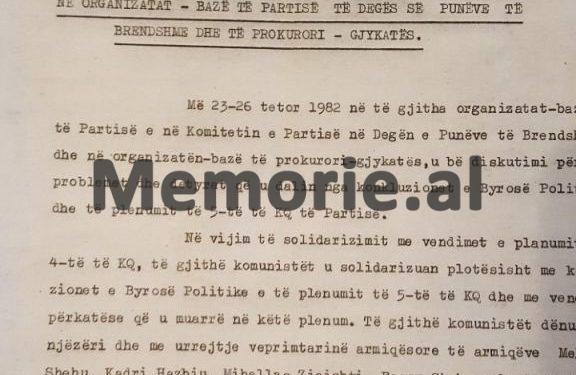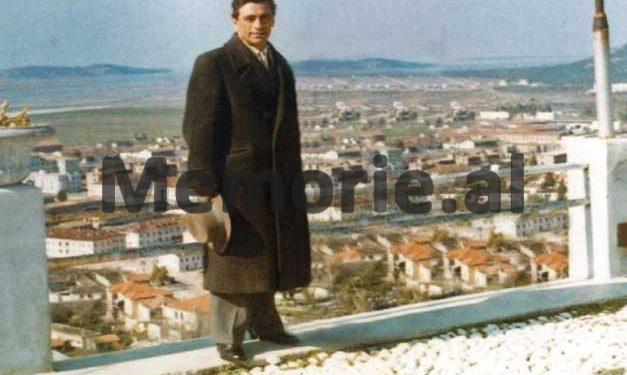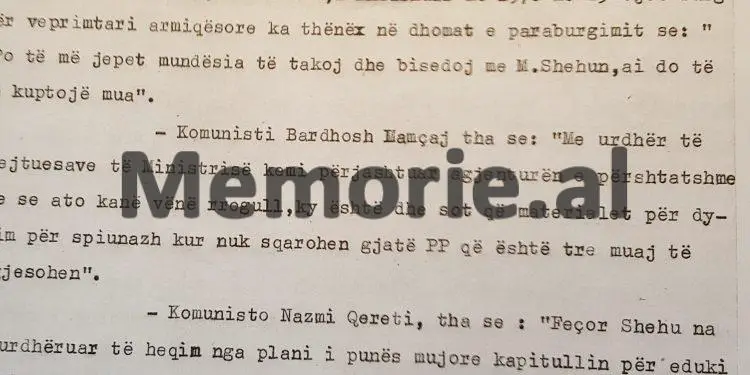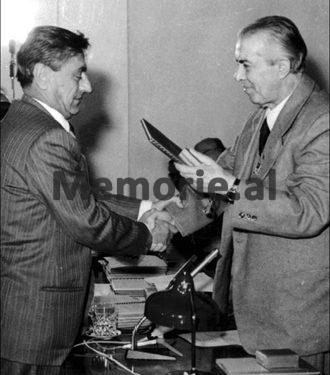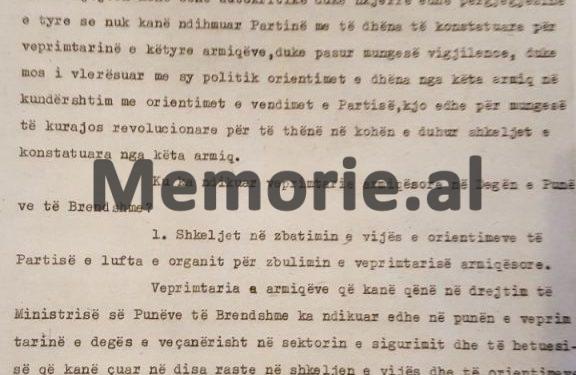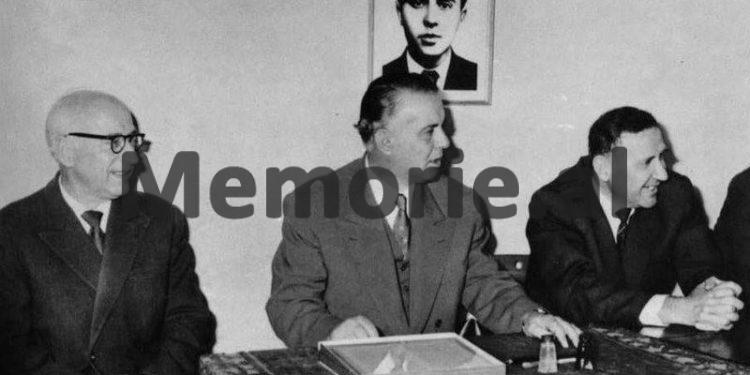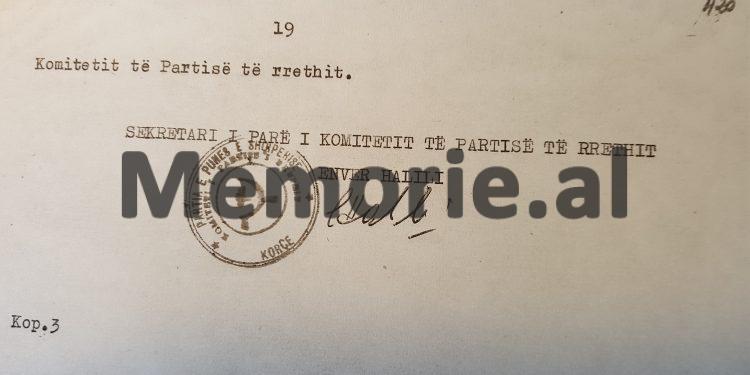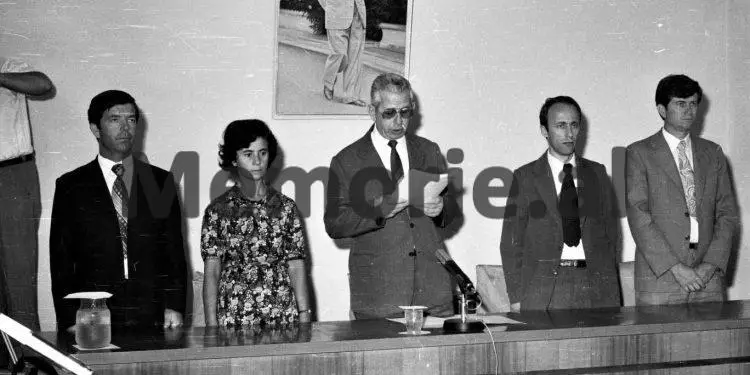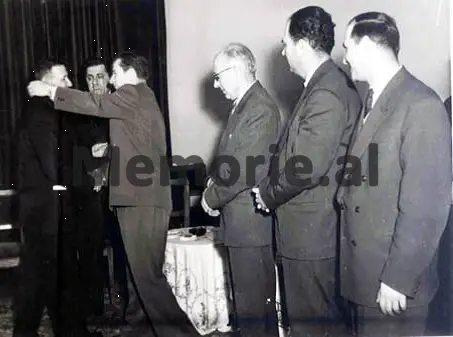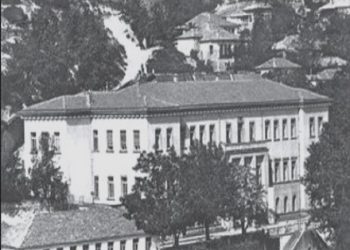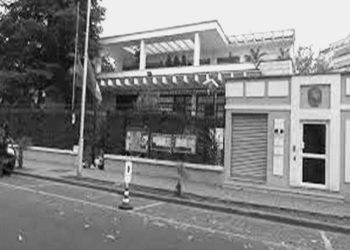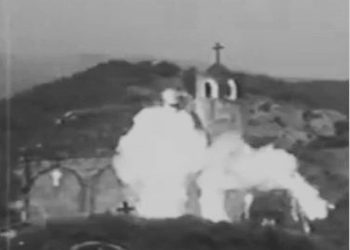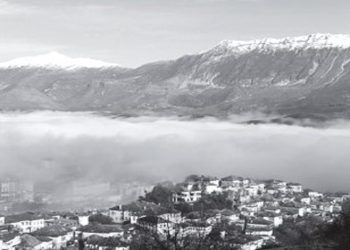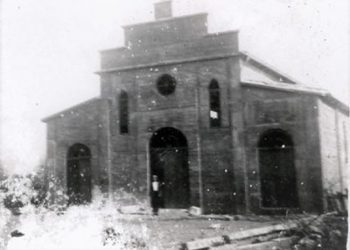Dashnor Kaloçi
Second part
Memorie.al publishes some archival documents issued by the Central State Archive in Tirana (fund of the former Central Committee of the ALP), which bear the logo “Top secret” and belong to the year 1982, where there are several information reports of the member of the Politburo, Spiro Koleka, the secretary of the Central Committee of the ALP, Vangjel Çerrava, the first secretary of the Party Committee of the Korça district, Enver Halili, etc., sent to the Central Committee of the ALP, regarding the meetings of committees of the Party of Pogradec and Korça, Branches of Internal Affairs of these districts, etc., where they had participated as delegates of the Central Committee. What was discussed in those meetings where Enver Hoxha’s letter was analyzed regarding the “Synoptic Table”, about “enemies and traitors, Mehmet Shehu, Kadri Hazbiu, Feçor Shehu, etc.”
Just a few weeks after the events of December 18, 1981, when Prime Minister Mehmet Shehu was found dead in his bedroom by a pistol bullet in very mysterious circumstances which even today after 40 years are still being discussed, with by order of the Central Committee of the ALP, in all the basic organizations of the Party, throughout the country, numerous meetings were held and held, where it was discussed; “In the spirit of the speech of comrade Enver Hoxha, on the ‘Synoptic Table’ for the enemy and polyagent Mehmet Shehu” In all these meetings, among others, as it is known from a number of documents with the logo “Top secret”, found in the Central State Archive, the Archive of the Ministry of Interior and the Ministry of Defense, many participants and discussants who have taken the floor there, have made all kinds of accusations, true and false, denunciations, spies, slander, fabrications, gossip, intrigue, fabrication and everything that has suited them, all in the direction and against the former the late Prime Minister, Mehmet Shehu, his family and those who were considered their collaborators, mentioning dozens of names, military, senior officials, etc., etc. Likewise, these meetings intensified greatly, especially after October 1982, when the Minister of Defense, Kadri Hazbiu, was arrested (who had held the delicate post of Minister of Interior for almost three decades), where he was also arrested., the same picture was repeated, as with former Prime Minister Mehmet Shehu. And after the holding of these meetings, the party committees of the respective districts, have drafted a series of reports with summaries of the “main problems”, which were then sent to the Central Committee of the ALP. For all these meetings, the editorial office of Memorie.al, has a large number of documents extracted from a voluminous file with the initials “Top secret”, where former members of the Politburo, secretaries of the Central Committee at the time, such as Spiro Koleka, Enver Halili, Vangjel Çerrava, etc., inform the Central Committee about the meetings they attended, giving in detail everything that was said and discussed there. In addition to these reports, the file in question also contains a series of reports compiled by lower-ranking officials from the Central Committee onwards, or collegial reports of the Branches of Internal Affairs in the districts, headquarters, commands and committees. of the party of military corps, which were also the largest units that the Albanian army had at that time. From this voluminous file, in the last issue we published the report-information of the former member of the Political Bureau of the Central Committee of the ALP, Spiro Koleka, sent to the Central Committee, regarding the party asset of the district of Pogradec, where he participated as a delegate, on September 25-28, 1982. While starting today, we are publishing the full report-information of the former first secretary of the Party Committee of Korça district, Enver Halili, sent to the Central Committee of the ALP- on, “the hostile activity of the group of Mehmet Shehu, Kadri Hazbiu, Feçor Shehu, etc.”, which he has extracted from the meetings held in the Korça Branch of Internal Affairs as well as in the Prosecution and the Court of that district. These documents, as a rule, have been read by all Enver Hoxha, but they are not signed by him and there is not even any note, as he has done with all other documents over the years, which from some reliable sources, it is said that Enver, they have read them, because of his aggravated health condition.
Continued from the previous issue
ALBANIAN LABOR PARTY Top secret
DISTRICT PARTY COMMITTEE
Korça, Korça, on 28.10.1982
I N F O R M A C I O N
For
SOME PROBLEMS THAT RISE FROM DISCUSSION OF CONCLUSIONS
POLITICAL BUREAU AND THE 5TH Plenum of the Central Committee of the Party
IN THE BASIC PARTY ORGANIZATIONS OF THE LABOR BRANCH OF
DOMESTIC AND THE PROSECUTOR-COURT
On October 23-26, 1982, in all the basic organizations of the Party and in the Party Committee in the Branch of Internal Affairs and in the basic organization of the Prosecutor-Court, the problems and tasks arising from the conclusions of the Politburo and the Plenum were discussed. of the 5th Central Committee of the Party.
Following the solidarity with the decisions of the 4th Plenum of the Central Committee, all communists fully showed solidarity with the conclusions of the Politburo and the 5th plenum of the Central Committee and with the relevant decisions taken in this plenum. All communists unanimously and with hatred condemned the hostile activity of the enemies Mehmet Shehu, Kadri Hazbiu, Mihallaq Ziçishti, Feçor Shehu and their collaborators, unanimously approved the relevant decisions and expressed their unwavering love and loyalty to the party and comrade Enver Hoxha. At the same time, in the spirit of criticism and self-criticism, they analyzed their work and activity in the sectors covered by the organizations and raised problems, which we are saying as they posed themselves and which are related to the activity of the Branch, the Prosecutor- Court and the Ministry of Internal Affairs.
From this discussion arose facts and arguments that deepen the recognition and hostile activity in these bodies.
I. IN THE INTERNAL AFFAIRS BRANCH
All the communists considered completely correct the conclusion of the Central Committee of the Party that all hostile plots were discovered by the Party and not by the State Security organs, that at the head of these organs were agents of capitalist-revisionist intelligence, who with intentionally distorted the work of the Security and camouflaged their hostile activity. At the same time, they made self-criticism, emphasizing their responsibility, that they did not help the Party with established data on the activity of these enemies, lacking vigilance, not evaluating politically the orientations given by these enemies in contrary to the orientations and decisions of the Party, this is also due to the lack of revolutionary courage to say in due time the violations ascertained by these enemies.
WHERE DID THE FRIENDLY ACTIVITY AFFECT THE INTERNAL AFFAIRS BRANCH?
- Violations in the implementation of the line of orientations of the Party and the struggle of the body for the detection of hostile activity. The activity of the enemies that have been in the direction of the Ministry of Interior has also affected the work and activity of the Branch and especially in the Security and Investigation sector that have led in some cases to the violation of the line and orientations of the Party. The work of the Security organs was oriented with their camouflaged method and forms to focus more on agitation and hostile propaganda, and this was strongly demanded. The evaluation of the work was done by the number of strokes regardless of the direction in which these strokes were.
This has led to the blows being directed mainly at the agitation and hostile propaganda, where there have been many arrested, sometimes even arrested without dignity, with flaws, etc. In the period 1971-1981, 281 subjects were committed for the crimes pursued by the Security, but of them only 12.9% with arrests were from the rich and 61.6% from the poor and middle classes, of the latter individuals may in particular to have escaped imprisonment through counseling. To increase the number of convicts for agitation and propaganda, there have been cases where the same witness has been used 3-4 times, or there have been arrests in special cases that have been brought to trial with only one piece of evidence.
Security personnel have pressured the investigation that any file opened to see the investigation would definitely end in arrest and trial. The collaborators, until the conclusions of the Politburo were conclusive in January 1981, were not always used to clarify a particular well-composed element who had uttered a word of hostility in order to give up and get on the right track. On the other hand, in the practice of counseling used by the Branch during the period 1976-1981, in 335 advised persons, there were some cases that counseling was done even for the element of rich strata, contrary to certain criteria.
Friends of the Investigation have raised the problem that even when they did not see the right arrest, for which in some cases the district prosecutor did not agree, the file was sent to the General Prosecutor, through the Ministry, who ordered the arrest.
Contrary to the clause of the Politburo on the administrative subordination of the Investigation to the President of the Branch, gradually through the orders and instructions of Kadri Hazbiu and Feçor Shehu, the Investigator became fully subordinated to the chairman of the Internal Affairs Branch, forcing the investigation sector to take his consent to the principal actions she took. In cases when the operational sector requested the arrest of persons with weak evidence and the Investigation did not agree, the leaders of the Ministry with their manipulations, approved such proposals. This was done with campaigns, especially when it was seen that the Branch did not have strikes, the main motivators for this were Kadri Hazbiu, Feçor Shehu, Elham Gjika and Kadri Gojashi. Also, in cases of important events, beatings were carried out arresting many people.
Those arrested for throwing banners in 1975 were taken to Pogradec and the work and investigation was led by Rexhep Kolli and the former Deputy Director of Security, Lirim Pëllumbi. My opinion is that this process should be re-studied.
According to the guidelines given by Feçor Shehu by the Branch was taken as an object of special importance the Executive Committee of K.P. of the district. It has become a working practice that the important issues pursued for crimes against the state be centralized in the Ministry, when it came to espionage. Some of the detainees in the Branch, when giving information to the investigation for sharp agency activities, were immediately taken by the Ministry to continue the investigation on the pretext that the center has “qualified” staff, “has good conditions”, etc., etc… The view is that this was done in order to cover or limit the agency activity for those cases in which they have an interest.
These actions speak of the fact that in some cases even in the Branch they have been subjected to the orientations of the enemy’s contrary to the Party line. In an analysis made in the Security for the city of Korça, Feçor Shehu threw the hostile orientation at the time when he heard the number of problems that were pursued for espionage and where the largest percentage were occupied by foreign intelligence agents, he said: “…. “Where do you come from, what do you remember, do not let the spies kill us”, which also influenced that if in 1978 there were 45 elaborations for foreign intelligence agents, in 1979 it was reduced to 40, in 1980, to 28 and in 1981 at 28.
At the same time, he and his comrades influenced through the cadres coming from the center, to remove the problems from the pursuit and to reduce their number, by influencing indirectly or by approving such actions. From the Ministry, the officers of the command commissioned by Feçor Shehu have said: “Do not deal with the Vlachs, you have hit enough for espionage, but sit in 2B”. In one case when talking about a possible elderly agent, Hodo Hodaj (head of the branch in the Ministry), he said: “Yes, you, deal with the elders of the League of Prizren”.
In March 1981, in a telegram sent by Feçor Shehu, he stated: “What is being done, that no proposals are being submitted to the investigation. There is a decrease in the pursuit of active problems for the realization of the elaborations, which can be seen in the few proposals that you have made to the Ministry during these months of 1981”. Kadri Hazbiu and Feçor Shehu, have given instructions to the Investigator that: “no defendant should be sent to court in a state of denial”, or the other that Feçor Shehu said, that; “Whoever dismisses the case has ridden a horse in Trotskyism.”
Through numerous requests for various studies and analyzes and tasks dictated from above these enemies created overload and excessive bureaucracy in order not to deal with substantial problems such as those of espionage. We have been influenced and made mistakes by the method and activity of the leadership of the Ministry. For example, the idea was created among the Security staff that you could be good and that you were making arrests. We did not see how these were, in what direction and whether everything should be done, regardless of the guilt, it is about agitation and propaganda. This has led us to one-sidedness, even with consequences, that inclined from the lightest, falling in some cases and to extremism in the field of agitation and propaganda, we have neglected one of the important tasks, detecting and striking the agents of foreign discoveries. With their method, the leaders of the Ministry, especially Kadri Hazbiu and Feçor Shehu, have often made us neglect the main thing and deal with side issues and trifles. For example, they would do mischief when an escape occurred, which should not happen, but they used this to direct us to spend all our time and attention, the operating worker only in this area, so we left the other tasks important functional.
Criticism was also leveled at the Investigation sector for the need to better deepen the process of capturing the threads that emerge during the investigation. For all that was said above, the communist comrades made self-criticism and said: “We lacked the level of vigilance, we had the opportunity to oppose, in some cases in our work we put the Party out of control, we did not have the smell of appropriate to cases where Party norms and state laws have been violated, vigilance we have sought from others only outside the body, thinking that we are immune from hostile mistakes and influences, we have forgotten that the class struggle takes place even within our bosom and the principle believe and check, we have not realized in all our daily work. For example, the orders and instructions coming from the Minister, we have not confronted with the teachings of the Party and Comrade Enver Hoxha.
Some others said: “Due to the lack of ideo-political preparation in some cases we have borrowed some actions and non-partisan methods of the enemies, Mehmet Shehu, Kadri Hazbiu, Feçor Shehu, etc., we have suppressed and faded the criticism within the body until within the basic organizations of the party, some things that did not go well and that we talked to each other, we did not dare to say in state and in the Party, we were influenced by the arrogant behavior of the enemies, which we used in some cases with our subordinates, etc.
- Some of the directions where the cult of the cadres of the organ is reflected
In almost all the basic organizations of the Party it was raised that there is a cult in the cadres, especially in that of Security and Investigation, as cadres “better”, “more reliable”, “uncontrollable”, “infallible”, ” to make misfortune”. With their actions some Security cadres try to convince others that they do everything and are fully aware of any problem, that they do “special” work, and “big” work. The cult was created that as employees of the Ministry of Internal Affairs we are untouchable and gradually the concept was created that they are not influenced by the foreign bourgeois ideology, it was not understood that they are the object and subject of the class war./Memorie.al
FIRST SECRETARY OF THE DISTRICT PARTY COMMITTEE
ENVER HALILI
Continues tomorrow




